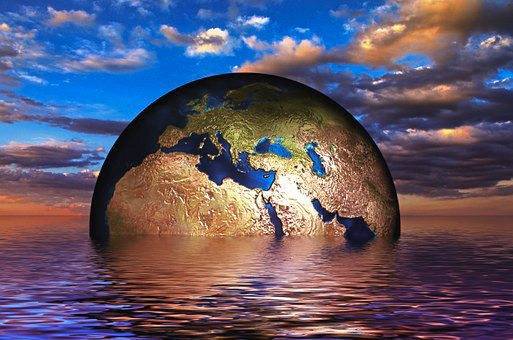This is not how anyone expected to celebrate the 50th anniversary of Earth Day. With the world on a coronavirus lockdown, planned celebrations join events from all walks of life in the canceled column, with Earth Day, like everything else, going virtual. For those of us who are alarmed about global warming, canceled activities provide an opportunity to ask what coronavirus can tell us about efforts to protect our climate. The answer — quite a lot, if one looks at it right.
To be sure, there are many differences between coronavirus and climate change. Covid-19 is very personal — although some will die, others may not get sick at all. Although the impact of climate change will vary across different parts of the world, people living in the same region will largely face similar impacts. Abrupt climate change is relatively new in human terms, but pandemics have occurred throughout history. Viruses are natural, while the climate change happening now is driven by human activity. Pandemics spread in weeks, while climate change unfolds over years.
Despite these differences, there is much common ground. We’ve seen that we’re all in this together. Not that everyone is impacted equally — there are some troubling inequities in the impact of the virus — but all of us are at risk. Everyone is better off if we cooperate. Even if we are lucky enough to get the virus without getting sick, we risk infecting others, thus the need for social distancing, which none of us can (safely) avoid.
The responses of many who have stepped up in support have shown us that we can come together as a community when needed. From clinicians to grocery store workers to cleaning staff, people have done their part to fight the tide of illness and to prevent others from being sick. Some act out of a sense of calling, while others may be desperately trying to maintain the income needed by their families, but they still show up. Meanwhile, others have jumped in to sew masks, distribute food at food banks, help their neighbors and otherwise pitch in, making a seemingly insurmountable problem feel at least a bit smaller. At the same time, we know that these steps aren’t enough to avoid the illness, death, isolation and economic deprivation that may define much of our lives for some time to come.
Finally, we’ve seen the importance of listening to epidemiologists and medical experts and implementing their guidance through decisive government action. Gov. Tom Wolf’s relatively early stay-at-home orders appear to have helped Allegheny County avoid — at least thus far — the outbreaks seen in hot spots such as New York City. Stronger measures in countries like New Zealand have been huge successes. Federal stimulus packages — although currently not sufficient to meet all of the needs of small business owners and the newly unemployed — provide critical economic relief.
All of these factors — the widely felt impact, the importance of individual and collective action, and the need for scientifically informed government involvement — apply to climate change as well. Although poor people and those in low-lying or otherwise vulnerable areas are on the front lines of climate change, everyone is ultimately at risk. Transitioning to a clean energy society will require that everyone — from individuals to large corporations — to rethink how they work, travel and otherwise use energy. Finally, governments must implement fact-based policies — regionally, nationally, and internationally — to fight climate change, like coronavirus, as the global challenge that it is.
There is on striking difference between the two — whereas coronavirus still seems intractable, we actually have a plan for climate change — the Energy Innovation and Climate Dividend Act. It’s not the complete answer, but it’s a good step forward. This bipartisan legislation (House Resolution 763) will put a gradually rising price on pollution, with almost all of the revenue going back to ratepayers in the form of dividends, which will exceed the fees for most families.
The increasing cost of carbon will provide incentives for folks to move to renewable energy, leading to a projected reduction of carbon emissions by 40% in 12 years. The resulting investment in renewables will be good for the economy, creating an estimated 2.1 million sorely needed new jobs. Perhaps best of all, dividends will start before the fees, providing some welcome cash to many families.
As we celebrate Earth Day from home, both coronavirus and climate change may seem insurmountable. Certainly neither problem will be easy to solve, but there are paths forward. If we work together and demand clear action from our elected officials (we’re looking at you, Reps. Doyle, Lamb and Reschenthaler and Sens. Casey and Toomey), we can make progress. Happy Earth Day!
Harry Hochheiser is a member of the Pittsburgh chapter of Citizens Climate Lobby.








